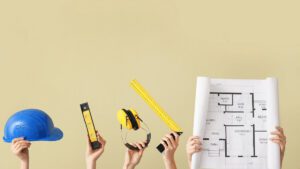The home inspection is a crucial component to consider if you are planning to buy or sell a property. The process involves an examination of the property for any possible issues. Inspection is generally completed by a professional inspector, who provides a comprehensive report on the home’s foundation, current condition, as well as what will need immediate attention or maintenance. The house condition can largely impact the selling price, which is why it’s vital to find a professional home inspection contractor. This is why you should know what is in the first place of home inspection checklist.
Home Inspection Checklist:
The home inspection checklist includes all the main elements that one should know before starting the inspection process. Each category in the checklist contains different elements; however, it mainly covers most crucial segments of the house, on what depends the overall cost of the property. If you are working with an experienced inspection company, they should inform you of the most important parts to look at, while here are the five most essential categories to have in your house inspection checklist.

- The Foundation of the House
The foundation includes primary places that catch the eye of the inspector, such as walls, roof, and other important parts. For instance, a roof inspection is vital to have in your report. Inspectors usually check its durability, and whether it has mold or splits. Thus, it is necessary to consider the maintenance of your property beforehand.
- Construction Structure
During the home inspection, it’s also important to pay attention to the house shape, size, material, and other fundamental components. The main rationale behind this is that the property price largely depends on the house firmness and shape. Therefore, if the material used for the construction doesn’t have high quality, it may reduce the final price.
- House Plumbing System / HVAC
It is also essential to list the property’s plumbing and HVAC units in home inspection checklist, provided that these are substantial aspects of the property worth close look. The home inspection aims to check for pipe leaks, rust, good airflow, hot water temperature, and basically longevity of systems that make the house function well.

- Electrical Systems
During the home inspection, it is also vital to make sure all electrical chains work properly. For instance, in the first place, the inspector may look at heating systems and security cables. You should be sure that you have all these sorted out because the buyer will want to live in a house without such issues. So, it will save them time, money, and effort to fix electrical panels.
- Interior and Exterior
There is a high value in a good exterior and interior of the property and it can affect the price significantly. During the home inspection, specialists will look at how everything works and generally the age of the house. They will check to see if the floor or the ceiling needs to be changed. Also, they will check up the paint, whether it has cracks and breaks. In general, the interior and exterior category involves the condition of the house from all views.
1. How much time does a house inspection take?
On average, home inspections take a couple of hours, depending on the size of the property. It can last anywhere from 2 to 3 hours for a house that’s about 1500 square feet. However, if the house is more spacious, then the time may vary based on the size. Despite the average process, a home inspection may take slightly longer than before because of the COVID-19. The timing doesn’t differ significantly, but there is a specific guideline for the home inspection, which might take some time.

2. What should a seller expect from a home inspection?
Generally speaking, a home inspection process checks whether the property is in a good condition and looks for anything that needs to be changed. It is vital to know that the process may cause deductions from the price of the house. Therefore, it may occur if the house has structural, material, internal, external issues (pipes, air conditioning, heating systems, walls, roofs, etc.)
3. How can the inspection impact selling/ purchasing a house?
Home inspections can affect the selling and buying process if there are significant issues. If some parts require replacement, which means there will be a need for financial spendings, then the selling price will reduce. Home inspections tend to find elements that may cause issues later to avoid those. For instance, the house may seem fine; however, the home inspector may insist on changing the water pipes, because after professional evaluation, he/she foresaw them breaking, cracking, or leaking in the future.
Another way the home inspection may affect the price of the house is due to structural problems. The construction of the house can affect the way it resists different climates. For example, there can be issues with the columns of the house that are responsible for withstanding earthquakes, hurricanes, and other force majeure situations. Thus, it is crucial to remember that the property needs to be firm, in good systematic and physical condition, as well as it must have great functioning systems.
4. How much will a home inspection cost?
On average, the price of inspection varies around 300 USD, but it can differ. Prices are starting from 200 USD, but the general price can go up to 600 USD. What can affect the home inspection cost? Firstly, it may have to do with the location of the house. For instance, in the first place, the price will be based on such factors as the distance of the property from the inspector, its size, selling price, and age.

5. What’s not included in the property inspection checklist?
Inspection may seem an easy process. However, it is vital to know what to expect and what not to expect to come with home inspections. The specialist will never look at the swimming pool, despite how much they can add to the value and the house price.
Inspectors also generally don’t inspect household appliances, furniture, or lead paint. These are details that do not interest the inspector because none of them will cause issues. It’s also not a home inspector’s job to check toxic materials such as radon gas or poisonous mold. Even though these can be problematic, it is not within their responsibility.
6. What to do after the home inspection process?
After everything is complete, the inspector should provide a home inspection report, which includes all the information about the house. The report can be a physical copy or a digital document that will contain a list of what’s wrong with the property, with attached images and descriptions of the problems with further possible solutions.
Then, after analyzing the inspection results, there are two options: the first solution is to understand the issues and resolve them with specific specialists. By doing so, it may solve the problems at an affordable price. Therefore, it will raise the house cost significantly. The second method is to modify and confirm the cost with the buyer. The purchaser can provide some of their finances from the budget they have prepared for the house, thus buying the property cheaper.

A home inspection is a very crucial task before selling or buying a property. It can change all plans because inspectors are experts who pay attention to details a house seller may never consider significant. A professional can determine the state of the house, which will lead to further actions. Most importantly, there is a need to find a really good home inspection service provider to get the best results for both parties; the buyer and the seller.



